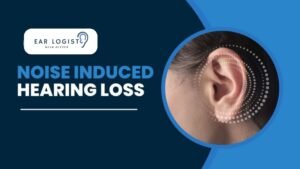Noise-induced hearing loss (NIHL) is a type of hearing loss caused by exposure to loud noises. It happens when the sensitive structures in the inner ear, particularly tiny hair cells, get damaged. These cells are responsible for helping us hear, and once they are damaged, they don’t grow back, leading to permanent hearing loss. NIHL can happen suddenly due to a very loud noise or develop over time from repeated exposure to loud sounds.
In this guide, we will explain everything about noise-induced hearing loss, its causes, symptoms, prevention, and treatments in simple terms.
What is Noise-Induced Hearing Loss?
Noise-induced hearing loss happens when the inner ear is exposed to loud sounds that damage the tiny hair cells inside. These cells help the brain process sounds, and if they get damaged by loud noise, they can’t repair themselves. When enough hair cells are damaged, it leads to permanent hearing loss.
This type of hearing loss can occur gradually if you’re around loud noise for long periods, like working in a factory or listening to music at high volumes. It can also happen suddenly after a very loud sound, such as an explosion or a gunshot.
What Causes Noise-Induced Hearing Loss?
Noise-induced hearing loss is caused by exposure to loud sounds. Here are some common causes:
- Loud Work Environments: People who work in noisy places, like construction sites, factories, or music venues, are often at risk of hearing loss if they don’t use ear protection.
- Headphones and Earbuds: Listening to music through headphones at high volumes for long periods can damage your hearing.
- Concerts and Loud Events: Attending loud concerts, sports events, or clubs can damage your hearing, especially if you are close to the speakers.
- Explosions or Gunshots: Sudden loud noises like fireworks, gunfire, or explosions can cause immediate hearing loss.
- Noisy Home Tools: Household items like lawnmowers, chainsaws, or leaf blowers can also damage your hearing if used for long periods without ear protection.
Symptoms of Noise-Induced Hearing Loss
If you have noise-induced hearing loss, you may notice these symptoms:
- Difficulty hearing conversations: You might find it hard to hear what people are saying, especially in noisy places like restaurants.
- Tinnitus (ringing in the ears): A constant or occasional ringing, buzzing, or hissing sound in the ears is a common symptom. This condition is called tinnitus and often goes hand-in-hand with hearing loss.
- Sounds are muffled: You may find that sounds seem muffled, unclear, or distant.
- Trouble hearing high-pitched sounds: The ability to hear high-pitched sounds, like birds chirping or children’s voices, can decrease with noise-induced hearing loss.
Who is at Risk for Noise-Induced Hearing Loss?
Anyone can develop noise-induced hearing loss, but certain people are more likely to get it, such as:
- Workers in noisy jobs: Construction workers, factory employees, and musicians who are exposed to loud noise daily are at higher risk.
- Music lovers: People who attend concerts or listen to loud music without ear protection may develop hearing loss over time.
- Military personnel: Soldiers who are exposed to loud explosions, gunfire, and heavy machinery are at risk.
- Young people: With the rise in headphone and earbud use, young people are more at risk of hearing loss from loud music.
Diagnosing Noise-Induced Hearing Loss
To diagnose noise-induced hearing loss, you’ll need to see a hearing specialist or audiologist. Here’s how they typically diagnose the condition:
- Hearing Test (Audiogram): A hearing test measures how well you can hear sounds at different pitches and volumes. This test helps determine if you have hearing loss.
- Medical History: The specialist may ask about your exposure to loud noise at work, home, or during leisure activities to understand the cause of your hearing loss.
- Ear Examination: A physical check of the ears will be done to ensure there are no other issues, such as earwax buildup, which could affect hearing.
Treatment for Noise-Induced Hearing Loss
Unfortunately, once noise-induced hearing loss occurs, it cannot be reversed. However, there are ways to manage it:
- Hearing Aids: These devices amplify sounds to make it easier for people with hearing loss to hear and communicate.
- Cochlear Implants: In cases of severe hearing loss, cochlear implants can be used. These devices bypass the damaged parts of the ear and directly stimulate the hearing nerve.
- Tinnitus Therapy: If you have ringing in your ears (tinnitus), sound therapy or counseling can help manage this condition.
- Hearing Protection: To prevent further damage, it’s essential to use ear protection like earplugs or noise-canceling earmuffs when you are exposed to loud sounds.
How to Prevent Noise-Induced Hearing Loss
Although noise-induced hearing loss cannot be reversed, it is preventable. Here are some simple ways to protect your hearing:
- Wear Ear Protection: If you are in a noisy environment, such as a concert, construction site, or while using power tools, always wear earplugs or earmuffs to reduce noise exposure.
- Turn Down the Volume: When listening to music, keep the volume at a safe level. A good rule is to follow the 60/60 rule: keep the volume at no more than 60% and listen for no more than 60 minutes at a time.
- Limit Exposure to Loud Sounds: If you are at a loud event, take breaks by stepping away from the noise for a few minutes to give your ears a rest.
- Check Your Hearing Regularly: If you work in a noisy environment, get your hearing checked regularly to detect any early signs of hearing loss.
The Impact of Noise-Induced Hearing Loss on Life
Noise-induced hearing loss can significantly affect daily life. It can make conversations difficult, especially in busy environments with background noise. This can lead to frustration and isolation, as social interactions become harder to follow. It can also affect job performance in roles that require clear communication.
For children, hearing loss can affect learning and development. In a classroom setting, students with hearing difficulties may struggle to follow along or participate in discussions, which can impact their education.
Early diagnosis and using hearing aids or other devices can help reduce the impact of hearing loss and improve quality of life.
Conclusion
Noise-induced hearing loss is a common but preventable condition. It happens when your ears are exposed to loud sounds, either gradually over time or suddenly after a very loud noise. While the damage is permanent, there are ways to manage the condition, such as hearing aids or cochlear implants.
The best way to protect yourself is by being mindful of your noise exposure. Use ear protection, lower the volume on personal devices, and avoid prolonged exposure to loud sounds. By taking these steps, you can prevent noise-induced hearing loss and protect your hearing for the future.
Also Read
- What is Fluctuating Hearing Loss?Fluctuating hearing loss means that a person’s hearing ability changes over time. One day, they might hear just fine, and the next day, sounds may seem muffled or distant. These changes can be temporary or happen repeatedly over time. Some
- What Is Hearing Loss Due to Cold?Hearing loss due to cold means your hearing is affected by a cold, either because of the cold weather or a common cold infection. When you have a cold, your nose gets blocked, and that can also affect your ears.
- Cochlear vs Retrocochlear Hearing LossHearing loss affects millions of people worldwide, but it doesn’t always occur for the same reasons or in the same part of the ear. Two common types of hearing loss are cochlear hearing loss and retrocochlear hearing loss. While both
- How to Calculate Hearing Loss PercentageHearing loss can be a complex condition that affects individuals differently. Some people may experience slight difficulty in hearing, while others might suffer from significant impairment. Understanding how to calculate hearing loss percentage is essential, especially for healthcare professionals, insurance
- Noise-Induced Hearing LossNoise-induced hearing loss (NIHL) is a type of hearing loss caused by exposure to loud noises. It happens when the sensitive structures in the inner ear, particularly tiny hair cells, get damaged. These cells are responsible for helping us hear,
Frequently Asked Questions
What is noise-induced hearing loss?
Noise-induced hearing loss (NIHL) is permanent damage to the hearing caused by exposure to loud sounds. It happens when the tiny hair cells in the inner ear are damaged by loud noises, either gradually or suddenly. These cells help you hear, but once they are damaged, they cannot repair themselves, leading to permanent hearing loss.
What causes noise-induced hearing loss?
Noise-induced hearing loss is caused by exposure to loud sounds like machinery, music, explosions, or firearms. Whether it’s long-term exposure in noisy work environments or short-term exposure to sudden loud noises, such as a concert or a gunshot, these sounds can permanently damage the inner ear’s hair cells and result in hearing loss.
What are the symptoms of noise-induced hearing loss?
Symptoms of noise-induced hearing loss include difficulty hearing conversations, especially in noisy places, ringing in the ears (tinnitus), sounds that seem muffled or distant, and trouble hearing high-pitched sounds like birds or children’s voices. The symptoms may appear gradually, or they can happen suddenly after a loud noise.
Who is at risk for noise-induced hearing loss?
Anyone exposed to loud sounds is at risk, but people in noisy environments are at higher risk. This includes workers in construction, factories, and music venues, soldiers, and those who frequently attend concerts or use headphones at high volumes. Even young people can be affected by prolonged exposure to loud music.
How can noise-induced hearing loss be diagnosed?
A hearing specialist or audiologist can diagnose noise-induced hearing loss through a hearing test (audiogram), where they check your ability to hear sounds at various volumes and pitches. They may also ask about your exposure to loud noises and examine your ears for any physical issues that could affect hearing.
Can noise-induced hearing loss be treated?
Noise-induced hearing loss cannot be reversed, but it can be managed. Hearing aids and cochlear implants can help people with hearing loss hear better. For those with tinnitus, sound therapy may reduce the ringing in their ears. Prevention of further damage with ear protection is also key to managing the condition.
How can noise-induced hearing loss be prevented?
Noise-induced hearing loss is preventable. You can protect your hearing by wearing earplugs or earmuffs in noisy environments, turning down the volume on your devices, limiting your exposure to loud noises, and taking breaks from noisy settings. Regular hearing check-ups can also help detect early signs of hearing damage.
How do loud sounds cause hearing loss?
Loud sounds cause hearing loss by damaging the tiny hair cells inside the ear that are responsible for converting sound waves into signals for the brain to understand. When these hair cells are exposed to loud noises, they can break or bend. Since they don’t regenerate, the damage leads to permanent hearing loss.
Is noise-induced hearing loss permanent?
Yes, noise-induced hearing loss is permanent. Once the inner ear’s hair cells are damaged by loud sounds, they cannot repair or grow back. This leads to irreversible hearing loss. However, the condition can be managed with hearing aids or implants, and preventive measures can help protect your hearing from further damage.
Can young people get noise-induced hearing loss?
Yes, young people can get noise-induced hearing loss, especially due to prolonged exposure to loud music through headphones or attending concerts. Many teenagers and young adults are at risk if they listen to music at high volumes for long periods. It’s important to practice safe listening habits to prevent hearing damage.








